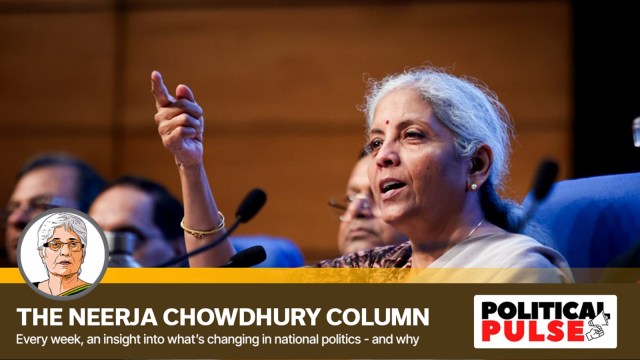© The Indian Express Pvt Ltd
Latest Comment
Post Comment
Read Comments
 Union Finance Minister Nirmala Sitharaman addressing a press conference after presenting the Budget 2024. (Express photo by Praveen Khanna)
Union Finance Minister Nirmala Sitharaman addressing a press conference after presenting the Budget 2024. (Express photo by Praveen Khanna)A coalition government is in the saddle again. That was the underlying message of Union Finance Minister Nirmala Sitharaman’s seventh consecutive Budget on Tuesday, with BJP allies Nitish Kumar and N Chandrababu Naidu cornering a major share for their states. It was also a response to Mandate 2024 – and the lessons drawn from it.
The TDP chief and Andhra Pradesh Chief Minister, Naidu is known to be a tough negotiator, and his bargaining skills were on display in Sitharaman allocating Rs 15,000 crore to his state this year for his dream capital Amaravati — with a promise of more funds in the years to come. There was also the promise to build industrial corridors between Vizag and Chennai, and Hyderabad and Bengaluru, apart from development of three backward regions in the state, for starters.
Nitish, known more for his savvy in forging successful caste alignments, also showed financial acumen. Or his team did. While the CM may not have got special status for Bihar, as demanded by the JD(U), Nitish has reason to be happy given the announcements of expressways, airports, bridges over the Ganga, and development of religious and cultural centres in Gaya and Bodh Gaya and Nalanda to promote tourism.
Primarily, the 16 MPs of the TDP from Andhra and 12 of the JD(U) from Bihar – apart from others such as 5 of Chirag Paswan’s Lok Jan Shakti Party (Ram Vilas) and 1 of Jitin Majhi’s Hindustani Awam Morcha – prop up the Modi government.
And in a coalition ministry, no one is as well placed as a party whose support the government relies on to remain in power – which was also evident during the 25 years of coalition governance in the country from 1989-2014.
Nitish and Naidu appear to have played their cards well in choosing hard cash to propel their development agenda for their states, rather than benefits such as lucrative Cabinet posts. They did not even insist on the post of Speaker, as once expected of them to do, and which the Opposition parties egged them on to demand. A Speaker’s position can become critical in a coalition ministry if splits take place and the ruling party tries to acquire a majority.
Equally significantly, this deal appears to have suited Prime Minister Narendra Modi who, in the trade-off, ensured unchallenged political control for himself and for the BJP. The heavyweight portfolios as well as the Speaker’s post remain with BJP leaders, helping the Modi government give the impression of business as usual and of being as much in control of the situation as when the BJP had a majority on its own. Modi would be well aware of how weakened a PM buffeted around by his allies can appear.
However, what remains to be seen is how the states which voted for the BJP will react to Andhra and Bihar cornering the Budget’s benefits. The party did some juggling in this regard with Sitharaman talking of a ‘Purvodaya’ plan for development of the eastern region, in which she included West Bengal, Jharkhand, Odisha and Andhra. The eastern belt has been on the BJP’s radar for quite some time now.
Normally, it is the interim budget presented before the elections which is populist in nature – for reasons that are obvious. This year though the interim budget focused more on fiscal consolidation and less on sops, which was seen as a sign of how confident the Modi government was about coming back to power without any need for populism.
Again, normally, the first Budget of a government takes the tough decisions — like, say, second-generation economic reforms, which have been pending. But the government went against the grain Tuesday, hewing closer to the nature of a coalition government’s politics.
Besides keeping its allies in good humour, the BJP brass is conscious of the need to win state elections due year end in Maharashtra, Haryana and Jharkhand – to seize the political initiative again and undo the impression that the party is losing ground. While there were no overriding promises for the poll-bound states, the Modi government appears to be calculating that the larger focus on jobs will help it fight the public discontent reflected in the Lok Sabha results.
Sitharaman’s outreach to the middle class is also an attempt to win back many in the BJP’s former base, who may have voted against it but may have begun to feel guilty that the party ended up losing its majority.
This suggests that the BJP has drawn the right lessons from the general elections, particularly regarding issues such as jobs, MSMEs and rural distress which it has been accused of ignoring. And has shown flexibility to make the concessions that rivals have accused it of being incapable of making.
In fact, on Tuesday, the Congress’s refrain was about the many “parallels” between its poll manifesto promises and the Budget. A backhanded compliment to Nirmala Sitharaman?


